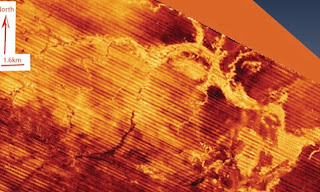'Britain's Atlantis' - a hidden underwater world swallowed by the North Sea - has been discovered by divers working with science teams from the University of St Andrews. Doggerland, a huge area of dry land that stretched from Scotland to Denmark was slowly submerged by water between 18,000 BC and 5,500 BC.
Divers from oil companies have found remains of a 'drowned world' with a population of tens of thousands - which might once have been the 'real heartland' of Europe. A team of climatologists, archaeologists and geophysicists has now mapped the area using new data from oil companies - and revealed the full extent of a 'lost land' once roamed by mammoths.
 |
| Sonar image of a drowned river |
The research suggests that the populations of these drowned lands could have been tens of thousands, living in an area that stretched from Northern Scotland across to Denmark and down the English Channel as far as the Channel Islands.The area was once the ‘real heartland’ of Europe and was hit by ‘a devastating tsunami', the researchers claim. The wave was part of a larger process that submerged the low-lying area over the course of thousands of years.We have much the same situation on the East Coast of the United States. With an extremely wide, flat continental shelf, the ocean retreated many miles out to sea during the glaciations, and the human population of North America, just getting started at the time, almost certainly made use of that region. The Chesapeake Bay was dry at the time, a valley with the Susquehanna at the bottom, and other rivers running down into it.
That's the first I've heard of a tsunami having such an effect there, but I suppose it's not shocking. There are several possible sources for large tsunamis in the Atlantic, volcanoes in Iceland, collapsing island in the canaries, not to mention the possibility of a large meteor strike anywhere.
It must have been "interesting" times living in a low country, being swallowed by the ocean at a significant rate. Sea level rise was much faster after the end of the last ice excursion. Sea level rise at a few mm a year is barely noticeable to us, but to people living in Doggerland, it must have seemed as if the ocean were literally chasing them back.'People seem to think rising sea levels are a new thing - but it’s a cycle of Earth history that has happened many many times.'

No comments:
Post a Comment